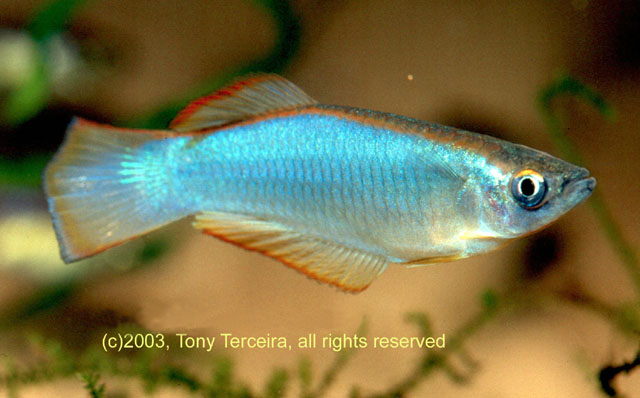| Procatopodidae (African lampeyes), subfamily: Procatopodinae |
| 6 cm TL (male/unsexed) |
|
benthopelagic; freshwater; pH range: 6 - 8; dH range: 5 - 12, non-migratory |
| Africa: on the coastal plain rain- and secondary forests in southern Nigeria (Ref. 3788, 57259), west and east Cameroon southward to Lokundje river (Ref. 3788). |
|
Dorsal spines (total): 0-0; Dorsal soft rays (total): 9-13; Anal spines: 1-1; Anal soft rays: 15-19. Diagnosis: larger-sized ‘Lampeye’ species with rounded dorsal and anal fin; fin extensions may be present at the upper and lower corners of the caudal fin and at the anal fin; ventral fins inserted below or just behind pectorals; dorsal fin with 9-13 rays; anal fin with 15-19 rays; scales on mid-longitudinal series 27-31 (Ref. 57259).
Colouration: Male colouration: variable in colouration; light olive to light grey body colour, on the sides strong light blue reflections; on the back in some populations a red-brown stripe, parallel to the dorsal profile; the colour of the unpaired fins is variable and ranges from light blue-grey through yellow and orange to red; these fins usually with a pattern of red spots and stripes; sometimes a dark red margin is present; the caudal fin usually light blue reflecting at its base, changing in the colour as found in the other fins; in its central part spots or stripes in red, usually forming crossbars; a red margin at the upper and lower side may be present; fin extensions, when present mostly white (Ref. 57259). Female colouration: simply semi-translucent grey or pale olive; ventral area more white to silver; unpaired fins colourless (Ref. 57259). Both sexes show an orange reflecting upper part at the eye iris (Ref. 57259). |
| Found in small rivers and brooks, mainly in the streaming parts on sedimentary soils; in coastal plain rainforests and secondary forests (Ref. 3788, 57259). Not a seasonal killifish. Is difficult to maintain in aquarium (Ref. 27139). |
|
Least Concern (LC); Date assessed: 12 September 2019 Ref. (130435)
|
| harmless |
Source and more info: www.fishbase.org. For personal, classroom, and other internal use only. Not for publication.
